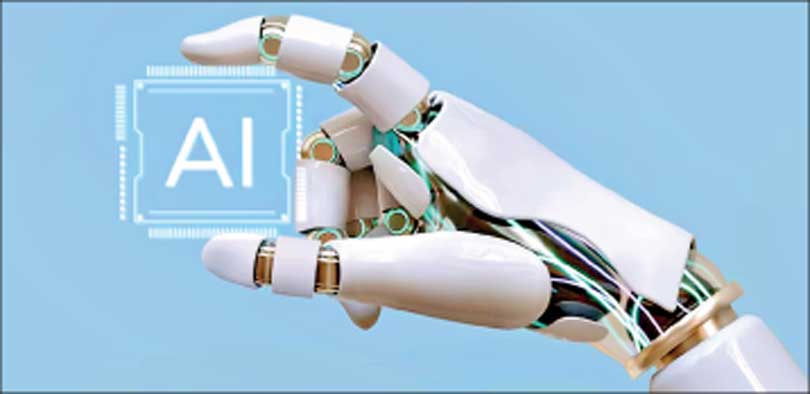Monday Feb 23, 2026
Monday Feb 23, 2026
Wednesday, 31 January 2024 19:22 - - {{hitsCtrl.values.hits}}

By Nuzla Rizkiya
Artificial Intelligence (AI) is a raging transformative force reshaping the way the world lives, works, and interacts with technology. As a branch of computer science dedicated to creating intelligent machines capable of simulating human-like cognitive functions, AI has evolved from a theoretical concept to a practical and pervasive reality.
Experts all over the world regard artificial intelligence as a factor of production which has the potential to introduce new sources of growth and change the way work is done across many industries. PricewaterhouseCoopers International Limited - a leading global professional services network predicts that AI could potentially contribute $ 15.7 trillion to the global economy by 2035. China and the United States are primed to benefit the most from the coming AI boom, accounting for nearly 70% of the global impact.
The foundations of Artificial Intelligence
At its core, Artificial Intelligence seeks to endow machines with the ability to perceive their environment, reason, learn from experience, and thereby make decisions autonomously. The roots of AI can be traced back to the mid-20th century to pioneers like Alan Turing (1912-1954) and the development of early computing machines. However, the field began to gain significant momentum in the 21st century, driven by advances in computing power, the availability of large datasets, and breakthroughs in machine learning algorithms.
What Is Artificial Intelligence?
Artificial intelligence (AI) is defined to be the simulation of human intelligence in machines which are then programmed to think and act like humans. Learning, reasoning, problem-solving, perception, and language comprehension are all examples of cognitive abilities simulated as artificial human intelligence.
Artificial Intelligence is a method of making a computer, a computer-controlled robot or a software which can think intelligently like the human mind. AI is generally accomplished by studying the patterns of the human brain and by analysing the cognitive process. The outcome of these studies develops intelligent software and systems.
Weak AI vs. Strong AI
When discussing artificial intelligence (AI), it is common to distinguish between two broad categories- Weak AI and strong AI.
Weak AI (Narrow AI)
Weak AI refers to AI systems that are designed to perform specific tasks and are limited to those tasks only. These AI systems excel at their designated functions but lack general intelligence. Examples of weak AI include voice assistants like Apple’s Siri or Amazon’s Alexa, recommendation algorithms and image recognition systems. Weak AI operates within predefined boundaries and cannot generalise beyond their specialised domain.
Strong AI (General AI)
Strong AI, also known as general AI, refers to AI systems that possess human-level intelligence or even surpass human intelligence across a wide range of tasks. Strong AI would be capable of understanding, reasoning, learning, and applying knowledge to solve complex problems in a manner similar to human cognition. However, the development of strong AI is still largely theoretical and has not been yet achieved to date.
How is AI already standing out in different industries?
As the globally accepted AI technology is revolutionising the industry from various sectors, the comprehensive technology is now being applied in almost every industry.
Automobile - Fully self-driving cars are now a reality in the world. Tesla in the USA was the first company to make a car with all the sensors, cameras, and software needed for a computer to drive itself from start to finish. Trucks are said to be the next primary target for autonomy which will enormously impact road safety and infrastructure while saving companies money by reducing labor costs.
Finance - AI is now being used in the field to forecaste and support hedge-fund investment decisions. Predictive analytics (or forecasting) applies artificial intelligence using machine learning and statistical techniques to make predictions about future events based on previous data. For example, people can use AI to forecast and predict product sales, customer demand or even stock prices!
Healthcare - AI helps doctors to diagnose diseases by gathering data from health records, scanning reports and medical images. This helps doctors to make faster diagnoses and guide the patient for further tests or prescribe medications faster. In addition, AI can be used in the treatment process by monitoring patients and alerting their doctors when something goes wrong. According to Forbes, AI will save over 7 million lives in 2035.
The future of AI
The trajectory of Artificial Intelligence is observed to be pointing towards a future where machines increasingly collaborate with humans, augmenting human capabilities and solving complex problems. Advancements in deep learning, reinforcement learning, and quantum computing are poised to push the boundaries of what AI can achieve.
As we navigate the uncharted waters of AI, it is therefore crucial to approach its development and deployment with an enthusiastic, thoughtful and ethical mindset.